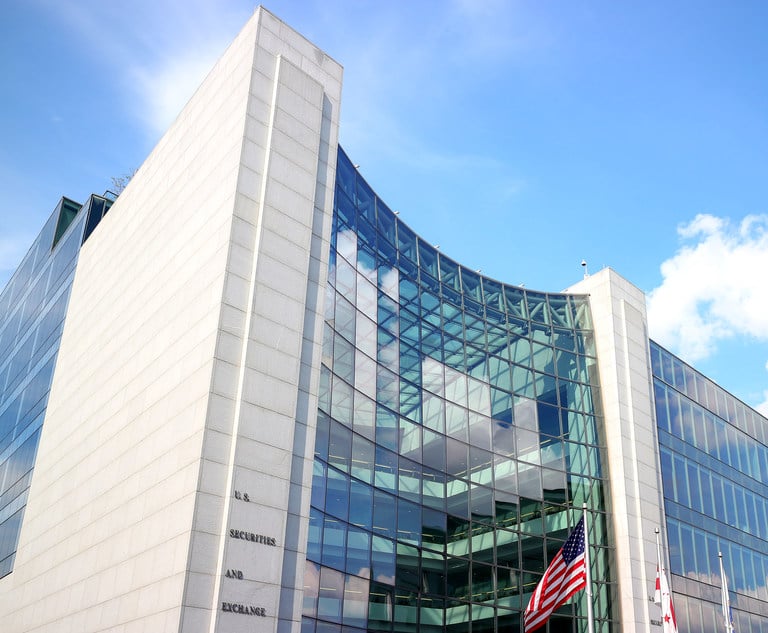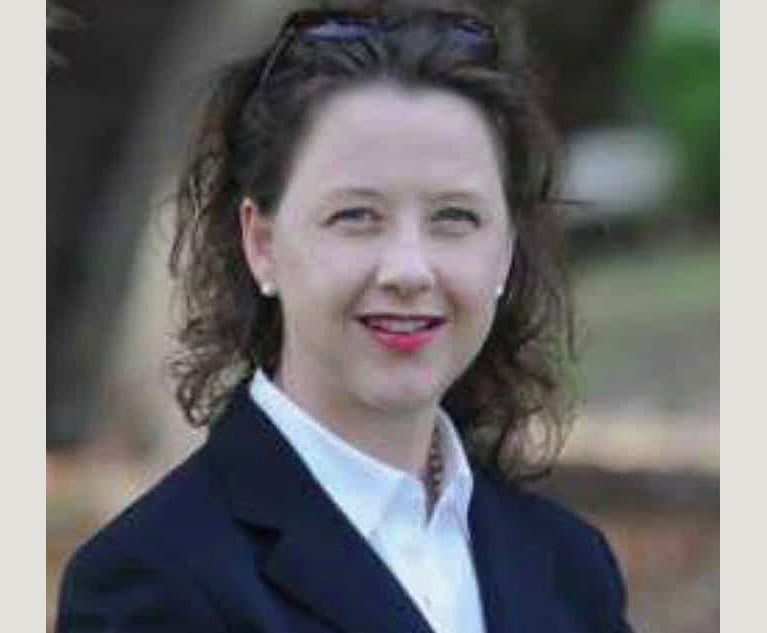Roberts Declares Himself First Amendment's 'Most Aggressive Defender' at SCOTUS
It was a remarkable comment—rare for a justice to attach himself to a certain line of jurisprudence.
February 13, 2019 at 01:56 PM
6 minute read
 Chief Justice John Roberts Jr. of the U.S. Supreme Court speaking in 2007. Credit: Diego M. Radzinschi/ALM
Chief Justice John Roberts Jr. of the U.S. Supreme Court speaking in 2007. Credit: Diego M. Radzinschi/ALM
During a public appearance last week, Chief Justice John Roberts Jr. used himself as an example to prove the point that members of the court should not be pigeonholed as liberal or conservative.
Speaking at Belmont University College of Law with its dean, former Attorney General Alberto Gonzales, Roberts said:
“I don't know where you put conservative or liberal in the First Amendment area, but I think I'm probably the most aggressive defender of the First Amendment on the court now. I think most people might think that doesn't quite fit with my jurisprudence in other areas.”
It was a remarkable comment: rare for a justice to attach himself to a certain line of jurisprudence, and notable also because of his suggestion that the First Amendment is a cause that most people don't associate with conservatives.
The days when liberal justices like Hugo Black and William Brennan Jr. were the main champions of the First Amendment faded long ago.
Roberts has picked up the mantle by issuing classic decisions that protect highly unpopular speech, while he and other conservative justices also invoke the First Amendment to produce conservative results.
Last year, Justice Elena Kagan said the court majority was “weaponizing” the First Amendment, in a case that struck down union agency fees for public sector employees.
We asked First Amendment scholars and advocates for their reactions to Roberts' comments. What follows are highlights, edited for length and clarity.
>> “Justice Kennedy was the former unchallenged holder of the title of 'most aggressive defender of the First Amendment'—and as a scholarly community, I'm not sure we've had time since Kennedy's departure to anoint his replacement on that front. I actually think the most interesting part of this statement is where Roberts says, 'I don't know where you put conservative or liberal in the First Amendment area.' A generation ago, it actually would have been surprising for an otherwise quite ideologically conservative justice like Roberts to self-identify as an advocate of a strong First Amendment, because the First Amendment free expression jurisprudence of the 1960s and '70s was the province of dissidents, protestors, pornographers and other boundary-pushers—folks the ideological conservatives on the court were not particularly keen to protect. A major trait of the Roberts court, though, has been a shift toward a more libertarian approach to the First Amendment, under which it is routinely employed as a tool for larger deregulatory aims. Indeed, it is one of the major jurisprudential developments for which the Roberts court will be known.” —RonNell Andersen Jones, University of Utah S.J. Quinney College of Law
>> “I do not think that Roberts is the most aggressive defender of the First Amendment on the court. I assume he is focusing on speech. But I think of his majority opinions in Humanitarian Law Project v. Holder and Morse v. Frederick as instances where he wrote majority opinions that ruled against free speech claims. He was in the majority in Garcetti v. Ceballos, which held that there is no First Amendment protection for speech of government employees on the job in the scope of their duties. That was a terrible decision for speech. In fact, some cases that look like they are protecting speech, like Janus v. American Federation, will actually mean less speech.” —Erwin Chemerinsky, dean of University of California, Berkeley School of Law
>> “Chief Justice Roberts is indeed a too-little-recognized stalwart defender of the First Amendment. That has been true both in cases in which one might have expected liberal jurists to have defended the challenged speech and ones in which conservatives might have been thought to have done so. Only in America would the vile speech of members of the Westboro Baptist Church be protected. And only in America would the legislature be barred, notwithstanding overwhelming public opinion to the contrary, from limiting the expenditure of unlimited sums in political campaigns. Chief Justice Roberts has led in the defense of both sorts of interests and has done so consistently. No one on this court has consistently defended First Amendment rights any more than the chief justice.” —Floyd Abrams, senior counsel at Cahill Gordon & Reindel
>> “Whether Roberts is the most aggressive defender of free speech depends upon one's views of the campaign finance line of cases. Chief Justice Roberts has written beautifully about the importance of the First Amendment in several contexts. Unfortunately, he was part of the majority in Garcetti v. Ceballos, a decision devastating to the First Amendment and the free-speech rights of public employees.” —David Hudson, Belmont University College of Law
>> “If the hallmark of a First Amendment defender is someone who is willing to protect the rights of unpopular speakers, then Chief Justice Roberts has definitely earned the title. He has come down on the side of decidedly unloved speakers like the Westboro Church, makers of animal snuff films, sexual offenders and people who falsely claim to have won military honors. It's interesting, however, that he thinks that people might be surprised to discover that he, among the members of the current court, is the justice who most often authors or joins opinions that protect speakers' rights. The beneficiaries of the chief's First Amendment decisions have included parties like pregnancy crisis centers, anti-abortion protestors, corporations, pharmaceutical companies, non-union employees, and Christian student groups. Speakers who have fared less well under a Roberts First Amendment, meanwhile, include students, prisoners, government employees, law schools and human rights groups who communicate with foreign organizations that the government has determined to have ties to terrorism.” —Sonja West, University of Georgia School of Law
Read more:
Why Roberts Sided With Liberals Blocking Restrictive Louisiana Abortion Law
Sheldon Whitehouse Confronts 'Anonymously Funded' SCOTUS Amicus Briefs
Chief Justice Roberts Rebuffs Trump After He Criticizes Judges Again
John Roberts Talks Kavanaugh, the Court's Shrinking Docket and 'Legally Blonde'
This content has been archived. It is available through our partners, LexisNexis® and Bloomberg Law.
To view this content, please continue to their sites.
Not a Lexis Subscriber?
Subscribe Now
Not a Bloomberg Law Subscriber?
Subscribe Now
NOT FOR REPRINT
© 2025 ALM Global, LLC, All Rights Reserved. Request academic re-use from www.copyright.com. All other uses, submit a request to [email protected]. For more information visit Asset & Logo Licensing.
You Might Like
View All
Hogan Lovells, Jenner & Block Challenge Trump EOs Impacting Gender-Affirming Care
3 minute read
GOP-Led SEC Tightens Control Over Enforcement Investigations, Lawyers Say

SEC Sued for Failing to Reveal Records Involving Simpson Thacher Attorney
4 minute read
Ex-Prosecutor’s Trial Ends as Judge Throws Out Her Felony Indictment in Ahmaud Arbery Death Case
Trending Stories
- 1DC Circuit Keeps Docs in Judge Newman's Misconduct Proceedings Sealed
- 2Litigators of the Week: US Soccer and MLS Fend Off Claims They Conspired to Scuttle Rival League’s Prospect
- 3Litigator of the Week Runners-Up and Shout-Outs
- 4U.S.- China Trade War: Lawyers and Clients Left 'Relying on the Governments to Sort This Out'
- 5Willkie Adds Five-Lawyer Team From Quinn Emanuel in Germany
Who Got The Work
J. Brugh Lower of Gibbons has entered an appearance for industrial equipment supplier Devco Corporation in a pending trademark infringement lawsuit. The suit, accusing the defendant of selling knock-off Graco products, was filed Dec. 18 in New Jersey District Court by Rivkin Radler on behalf of Graco Inc. and Graco Minnesota. The case, assigned to U.S. District Judge Zahid N. Quraishi, is 3:24-cv-11294, Graco Inc. et al v. Devco Corporation.
Who Got The Work
Rebecca Maller-Stein and Kent A. Yalowitz of Arnold & Porter Kaye Scholer have entered their appearances for Hanaco Venture Capital and its executives, Lior Prosor and David Frankel, in a pending securities lawsuit. The action, filed on Dec. 24 in New York Southern District Court by Zell, Aron & Co. on behalf of Goldeneye Advisors, accuses the defendants of negligently and fraudulently managing the plaintiff's $1 million investment. The case, assigned to U.S. District Judge Vernon S. Broderick, is 1:24-cv-09918, Goldeneye Advisors, LLC v. Hanaco Venture Capital, Ltd. et al.
Who Got The Work
Attorneys from A&O Shearman has stepped in as defense counsel for Toronto-Dominion Bank and other defendants in a pending securities class action. The suit, filed Dec. 11 in New York Southern District Court by Bleichmar Fonti & Auld, accuses the defendants of concealing the bank's 'pervasive' deficiencies in regards to its compliance with the Bank Secrecy Act and the quality of its anti-money laundering controls. The case, assigned to U.S. District Judge Arun Subramanian, is 1:24-cv-09445, Gonzalez v. The Toronto-Dominion Bank et al.
Who Got The Work
Crown Castle International, a Pennsylvania company providing shared communications infrastructure, has turned to Luke D. Wolf of Gordon Rees Scully Mansukhani to fend off a pending breach-of-contract lawsuit. The court action, filed Nov. 25 in Michigan Eastern District Court by Hooper Hathaway PC on behalf of The Town Residences LLC, accuses Crown Castle of failing to transfer approximately $30,000 in utility payments from T-Mobile in breach of a roof-top lease and assignment agreement. The case, assigned to U.S. District Judge Susan K. Declercq, is 2:24-cv-13131, The Town Residences LLC v. T-Mobile US, Inc. et al.
Who Got The Work
Wilfred P. Coronato and Daniel M. Schwartz of McCarter & English have stepped in as defense counsel to Electrolux Home Products Inc. in a pending product liability lawsuit. The court action, filed Nov. 26 in New York Eastern District Court by Poulos Lopiccolo PC and Nagel Rice LLP on behalf of David Stern, alleges that the defendant's refrigerators’ drawers and shelving repeatedly break and fall apart within months after purchase. The case, assigned to U.S. District Judge Joan M. Azrack, is 2:24-cv-08204, Stern v. Electrolux Home Products, Inc.
Featured Firms
Law Offices of Gary Martin Hays & Associates, P.C.
(470) 294-1674
Law Offices of Mark E. Salomone
(857) 444-6468
Smith & Hassler
(713) 739-1250








